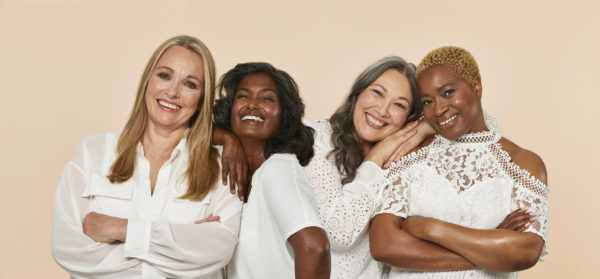I’m so happy to introduce you to the Age Without Apology Campaign founded by Jenni Retourne from Willowberry Skin Care. Jenni had a career in beauty PR before she founded her own brand so she’s had plenty of experience on both those sides of the industry. The thing about having your own little space on the internet is that you make your own narrative and the freedom of that is unbeatable – I’m grateful every day for it to be honest and never stop being thankful that people of all ages stop by. Older women have it tough in beauty space – as founders, employees and as consumers. It’s a never ending barrage of persuasion to be anyone other than you when the truth is that it’s okay to be you – very okay, in fact.

Jenni commissioned the Age In Beauty Survey – you will not be surprised at the results but I’ll take you through them anyway. The imagery I’m using is from The Age Without Apology Campaign – Jenni did a call out for ‘real’ women to take part in the shoot with stunning results. As part of the survey (of 1000 women aged 30-80) 97% felt it was important to see better representation of real older women used by brands and the media. We are usually shown in an anti-ageing context where the narrative is all about how looking younger makes us better.

Where there are older women used in beauty imagery, 77% of women feel that it is either in a negative way that tells us to reverse the signs of age, or that the celebrities and models used aren’t a realistic portrayal of age. Exactly this. There’s never a picture of an older women just having fun, messing about with coloured liners or laughing her head off wearing a glitter mask. We do have fun – tons of it and make up is the same playground for us as it is for anyone else but part of the reason that it’s not acknowledged or recognised is because beauty marketeers are generally in their twenties. I can’t name one over 50. They’ve only got their own lived experience to draw on when it comes to imagining what beauty looks like.

85% of women want to see more positive and realistic wording surrounding age in beauty. At the risk of arrows flying, another reason is that the anti-ageing narrative won’t die is that there are a lot of men at the top of the tree in the beauty industry and their experience of being an older woman themselves is nil. They’ve got their own ideals of beauty that often don’t – and can’t – align with ours.

50% of women surveyed even said that anti-ageing messaging makes them not look forward to getting older. Is this something we want to pass to our young friends or relatives? It shouldn’t be. Feeling more positive about your changing beauty phases will ripple down and it starts with speaking more positively to yourself and those around you.

72% of women polled either don’t like the term ‘anti-ageing’ or don’t believe the anti-ageing claim. And yet, we feel more or less grateful for the lotions and serums that are marked as such. It’s not inevitable that messaging around beauty has to include knocking you down to sell you better – the majority don’t like this term so why are we still accepting there’s no alternative? Being against negative messaging doesn’t mean you’re against wanting to look great, it doesn’t mean that you never take actions to suit yourself or your skin and it doesn’t mean that you shouldn’t chase a version of yourself that you like. I have Profhilo because it’s a next level glow and there is not an age in beauty who doesn’t suit radiance and I have Botox to keep my lids up while I still love wearing make-up. I feel I can use the beauty industry on my own terms, not those dictated to me. Anyone can.

Many of the survey participants felt they aren’t seen, that they’re a hidden part of the beauty narrative with one quote that really resonates – ‘I used to be beautiful’. She’s probably the only one that can’t see that she still is and yet I think she speaks for many. There is no ‘used to be’ about your beauty but a quick look in any magazine, social feed or brand website might tell you differently and enough is enough. If you use Instagram (or Facebook or Twitter even) you can post your picture using the hashtag #agewithoutapologycampaign and we’d love to see your face. We’d love brands to see your face, we’d love marketing to see your face, we’d love magazines to see your face and we’d love PR to see your face. Just so they know, unmistakably and unequivocally, that we exist and we have nothing to apologise for. You can read more about the campaign HERE.
*I’m part of the Founder Member Collective of industry peers that forms Willowberry’s Age Without Apology Campaign. It is a voluntary position.


Leave a Reply